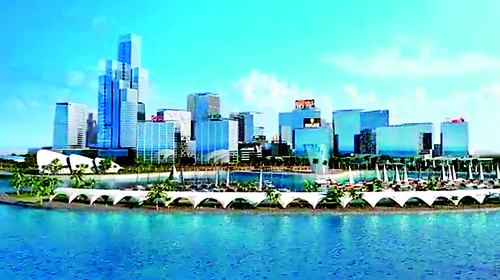Phase I of the Colombo Port city starts next month after clearing bottlenecks
Phase I of Sri Lanka’s proposed off-shore city, the Colombo Port City, is to start in September this year after completing all necessary requirements and legal documentation including Environmental Impact Assessment and signing of agreements with all connected parties of the project, a senior official of Sri Lanka Ports Authority (SLPA) revealed.
The land filling work under Phase 1 of the project will commence in two months from September and it is scheduled to be completed in 24 months while the whole project will be completed in 39 months, he said.

Artist’s impression of the Colombo Port CIty. Pic courtesy Wikipedia
Some 233 hectares of water front sheltered by a 3,300 metre long breakwater will be reclaimed under this US$900 million mega investment project.
China Harbour Engineering Company Ltd, a partnership of the China Communication Construction Co. Ltd is the main contractor with works like reclamation, breakwater construction, connected road network and supply of services.
The company has expressed willingness to invest $2 billion to create other facilities, SLPA official said.
The plan has been given approval by the Standing Cabinet Appointed Review Committee. The commencement of Phase 1 of the project had been postponed to September from the earlier scheduled date in March due to some delays in signing all relevant agreements and obtaining relevant approvals from state institutions, SLPA Planning and Development Chief Engineer Susantha Abeysiriwardena told the Business Times.
The port city will also have Sri Lanka’s first 100-storeyed skyscraper under Phase II of its work.
This phase would include the construction of the planned hotels, high rise buildings, and recreational facilities, shopping complex, golf course, office buildings and business centres.
According to the agreement, except for 125 hectares out of the total land area of 233 hectares which will be owned by the Government of Sri Lanka, the rest will be retained by the Chinese company to cover their costs of expenditure.
The balance of 108 hectares will be handed over to Chinese company under a 99-year lease basis. The company, at the initial stage, owns only the seabed.
Legal experts said that granting approval for the project with a complete ownership of the seabed for a considerable period of time with a view of significantly and permanently altering the marine landscape was against the statutory obligations of the Coast Conservations Act which restrict the use and occupation of the seabed.
They also noted that all statutes, laws and regulations and the associated legal and judicial structure and systems of Sri Lanka should apply for the Port City project and the reclaimed sea area.
According to the Act, the Director cannot issue a permit for a proposed development activity which may have any adverse effect on the stability, productivity and environmental quality of the Coastal Zone.
The Act states that even in instances where permits may be issued, the occupation of any part of the foreshore or bed of the sea lying within the Coastal Zone can only be permitted for any period not exceeding three years after which the permit may or may not be renewed.
They pointed out that environmental issues could crop up during the implementation of the project, and, if so, the government should tackle these for the benefit of the country.
Dredging of sand to build artificial islands will affect the turbidity of seawater as well as damage marine habitats such as coral reefs and shells covered by sand.
Therefore the government should be concerned about the possible consequences, and the viability and the sustainability when implementing such a project, they added.
But the SLPA official said that they have obtained the permit for the project and the reclamation of sea will be completed before the stipulated time frame in the Act and the legal matter of occupation of the seabed will not arise.


